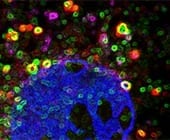
PARKINSON’S DISEASE
An estimated seven to ten million people worldwide are living with Parkinson’s disease (PD), which is an incurable and progressive disease of the nervous system affecting movement and cognitive function. More than half of PD patients develop progressive disease showing signs of dementia similar to Alzheimer’s disease. A research team at University of Copenhagen, Denmark, has discovered that non-inheritable PD may be caused by functional changes in the immune regulating gene Interferon-beta (IFN?). Treatment with IFN?-gene therapy successfully prevented neuronal death and disease effects in an experimental model of PD. The results have just been published in prestigious scientific journal Cell.
Protein regulates waste management in nerve cells
The human brain consists of approximately 100 billion neurons, which coordinate activities in all parts of the body. At Biotech Research and Innovation Centre (BRIC), University of Copenhagen, the group of Professor Shohreh Issazadeh-Navikas has discovered that the immune gene IFN? plays a vital role in keeping neurons healthy.
-We found that IFN? is essential for neurons ability to recycle waste proteins. Without this, the waste proteins accumulate in disease-associated structures called Lewy bodies and with time the neurons die, explains assistant professor Patrick Ejlerskov, the first author of this report.
The research team found that mice missing IFN? developed Lewy bodies in parts of the brain, which control body movement and restoration of memory, and as a result they developed disease and clinical signs similar to patients with PD and dementia with Lewy bodies (DLB).
New understanding of non-familial Parkinson’s disease
While hereditary gene mutations have long been known to play a role in familial PD, the study from BRIC offers one of the first models for so-called non-familial PD, which comprises the majority (90-95%) of patients suffering from PD. According to professor Shohreh Issazadeh-Navikas the new knowledge opens new therapeutic possibilities:
–This is one of the first genes found to cause pathology and clinical features of non-familial PD and DLB, through accumulation of disease-causing proteins. It is independent of gene mutations known from familial PD and when we introduced IFN?-gene therapy, we could prevent neuronal death and disease development. Our hope is that this knowledge will enable development of more effective treatment of PD, says professor Shohreh Issazadeh-Navikas.
Read more: Immune gene prevents Parkinson’s disease and dementia
The Latest on: Parkinson’s
[google_news title=”” keyword=”Parkinson’s ” num_posts=”10″ blurb_length=”0″ show_thumb=”left”]
via Google News
The Latest on: Parkinson’s
- UT Dean finds joy, help in learning to rock after Parkinson's diagnosison May 2, 2024 at 3:33 pm
Allan Cole picked up a bass a year ago and has improved his dexterity as well as given him a new outlook on life.
- Web platform and app aim to improve quality of life for people with Parkinson's diseaseon May 2, 2024 at 10:40 am
Parkinson's disease is one of the most prevalent neurodegenerative conditions worldwide. It causes motor impairments such as tremors, slow movement, muscle stiffness, and balance problems. Memory can ...
- Oklahoma City's Parkinson's Walk Raises Awareness, Funds For Oklahomans Affected By Diseaseon May 2, 2024 at 10:25 am
This weekend in the metro, a local fundraiser is spotlighting the fight to beat Parkinson's while promoting activity to help prevent the disease.
- Cyclists with Parkinson's stop in Richmond on their long ride from Virginia to Californiaon May 2, 2024 at 2:59 am
RICHMOND, Va. -- Richmond was the first stop on the 65-day journey across the country for the "Long Ride For Parkinson’s." Organizers called it an effort to build community and raise funds for the ...
- Who is Cecil Parkinson and what happened to Sara Keays?on May 1, 2024 at 8:29 am
Once tipped to be a future Prime Minister, Lord Parkinson's political career was derailed by a shocking sex scandal involving his long-time secretary Sara Keays ...
- 4 friends with Parkinson's disease cycling across the country to raise money for researchon May 1, 2024 at 7:57 am
CHICAGO (CBS) --Four friends will set off on a journey of a lifetime on Wednesday, cycling across America while raising money for two Parkinson's disease foundations. The Chicago-area organizer is ...
- Living your best life after a Parkinson’s diagnosison April 30, 2024 at 10:00 pm
Parkinson’s disease is a neurodegenerative disorder that progressively affects movement, leading to significant physical and neurological challenges. While symptoms and disease progression are unique ...
- Pedaling for Parkinson’son April 30, 2024 at 7:00 pm
SALT LAKE CITY, Utah (Ivanhoe Newswire) – Nearly one million people in the U.S. are living with Parkinson’s disease. There is no cure and symptoms only get worse. But a new program – backed by ...
- Parkinson's Newson April 30, 2024 at 5:00 pm
Apr. 30, 2024 — Researchers have found a way to better control the preclinical generation of key neurons depleted in Parkinson's disease, pointing toward a new approach for a disease with no ...
- She had Parkinson's and didn't want to live. Then she got this surgery.on April 30, 2024 at 10:29 am
Deep brain stimulation is a game-changer for patients like Peters amid the ongoing fight for medical breakthroughs for neurologic conditions.
via Bing News










